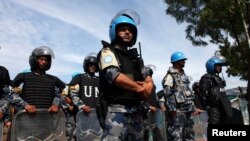While it should be a time of celebration, South Sudan is limping towards its third anniversary on July 9.
Torn apart by a power dispute between President Salva Kiir and his former deputy Riek Machar, the country has succumbed to inter-ethnic fighting between forces loyal to Kiir and rebels aligned with Machar.
The violence has left thousands dead and more than one million displaced.
In an effort to lift the country out of its downward spiral, the two leaders agreed in May to establish a “transitional government of national unity” and on June 10 set a 60-day deadline to form the interim government.
But talks between the two sides have once again broken down, due to opposition complaints about the exclusion of displaced people and groups in exile from the talks.
South Sudanese Information Minister Michael Makuei Lueth told VOA the government is still waiting for instructions from the East African bloc of states, IGAD, which has been mediating talks.
“If we are called, we are optimistic we will reach peace and we will agree within the 60 days as scheduled,” he said.
As reconciliation efforts continue to falter, citizens are becoming impatient with the country's leadership.
A senior U.S. State Department official, David Feldstein, traveled to South Sudan this week on a mission to speak to civil society groups and organizations and hear their thoughts on a way forward.
Feldstein told VOA people are growing tired of both President Kiir and opposition leader Machar.
“The biggest frustration I think is the fact that a lot of people feel that their own futures have been hijacked by two people who don't necessarily have the country's future in mind, but are certainly concerned about their own self-interests,” he said.
Some observers have suggested that both President Kiir and Machar should be excluded from a transitional government, but both sides have ruled out that possibility.
Lueth said the president has to stay on to implement peace agreements.
“There's no way you would say 'let President Salva go' so the agreement is implemented by a third party who is not part and parcel with the whole thing,” he said.
Meanwhile, the country's humanitarian situation continues to deteriorate. A group of British aid agencies warned this week that conflict, displacement and a lack of donor funds could push some populations into famine in the coming weeks.




